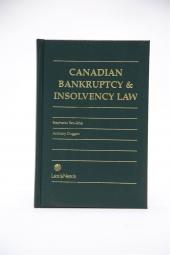Canadian Bankruptcy and Insolvency Law - Bill C-55, Statute c.47 and Beyond
One Year Subscription Only Terms
Subscribers receive the product(s) listed on the Order Form and any Updates made available during the annual subscription period. Shipping and handling fees are not included in the annual price.
Subscribers are advised of the number of Updates that were made to the particular publication the prior year. The number of Updates may vary due to developments in the law and other publishing issues, but subscribers may use this as a rough estimate of future shipments. Subscribers may call Customer Support at 800-833-9844 for additional information.
Subscribers may cancel this subscription by: calling Customer Support at 800-833-9844; emailing customer.support@lexisnexis.com; or returning the invoice marked 'CANCEL'.
If subscribers cancel within 30 days after the product is ordered or received and return the product at their expense, then they will receive a full credit of the price for the annual subscription.
If subscribers cancel between 31 and 60 days after the invoice date and return the product at their expense, then they will receive a 5/6th credit of the price for the annual subscription. No credit will be given for cancellations more than 60 days after the invoice date. To receive any credit, subscriber must return all product(s) shipped during the year at their expense within the applicable cancellation period listed above.
Product description
How Will Reforms Change the Law?
Canadian bankruptcy law faces a unique situation. Statute c.47 was enacted in late 2005 but has not yet come into force. The "2007 Amending Bill" now calls for substantial amendments to the Bankruptcy and Insolvency Act, the Companies' Creditors Arrangement Act, and Statute c.47.
What exactly do these proposed reforms mean? What influence can parliamentarians, practitioners, and academics exert during this "window period" to change Canadian bankruptcy and insolvency legislation?
Canadian Bankruptcy and Insolvency Law: Bill C-55, Statute c.47 and Beyondtackles these issues from a wide range of perspectives. Respected professors Stephanie Ben-Ishai and Anthony Duggan analyze the proposed reforms and related political concerns, together with:
David Baird
Tamara Buckwold
Ronald Davis
Alexandra Dostal
Steven Golick
John A. E. Pottow
Michael Rotsztain
Janis Sarra
Edward Sellars
Thomas Telfer
Roderick Wood
Jacob Ziegel
Thought-Provoking Questions to Encourage Dialogue
Each of the book's 15 chapters addresses a critical aspect of Canadian bankruptcy and reorganization law. Questions will spark debate on how current law and policy compare with developments in other countries, and whether existing proposals for reform actually meet Canada's economic needs.
- To what extent can - or should - Canadian legislation be influenced by U.S. legislation?
- Could harmonization with U.S. legislation inhibit economic development in Canada?
- Do other common law jurisdictions provide better models for reform?
- What would a distinctly "made in Canada" approach look like?
- Does Canada need both the BIA and CCAA?
- Where is greater consistency needed in the treatment of issues that are common to BIA and CCAA proceedings?
- When can judicial discretion lead to inconsistent solutions to problems across the country?
An Insightful Collection For:
- Bankruptcy and insolvency lawyers, corporate/commercial lawyers, and accountants who need a good grasp of the underlying policy issues in order to understand the law
- Provincial and Federal Governments, including Ministries of the Attorney General and Business & Consumer Affairs, who need to understand how federal legislation interacts with provincial law in areas such as fraudulent preferences and conveyances, and property exemptions
- Union leaders who want to learn more about the provisions of Statute c.47 that relate to workers' rights, including the Wage Earner Protection Program, collective agreements, and the priority for unpaid wages and pension contributions
- Academics and practitioners who take an active role in the review and reform of Canada's insolvency legislation
- Bankruptcy trustees who need to understand proposed reforms relating to discharge from bankruptcy, means testing and other matters
Table of contents
Acknowledgements
Chapter 1: Introduction
Chapter 2: Partly Performed Contracts
Chapter 3: Derivatives and the CCAA
Chapter 4: Labour Issues
Chapter 5: Priorities
Chapter 6: Voidable Preferences
Chapter 7: Gifts and Transfers at Undervalue
Chapter 8: Judicial Discretion
Chapter 9: Debtor-In-Possession Financing
Chapter 10: Corporate Governance
Chapter 11: Cross-Border Insolvencies
Chapter 12: The BIA and CCAA Interface
Related products
-
 Canadian Bankruptcy and Insolvency Law – Bill C-55, Statute c.47 and Beyond – Student EditionRelease date: January 01, 2007$185.00
Canadian Bankruptcy and Insolvency Law – Bill C-55, Statute c.47 and Beyond – Student EditionRelease date: January 01, 2007$185.00 -
 The Ontario Personal Property Security Act – Commentary and Analysis, 3rd EditionRelease date: August 24, 2020$390.00
The Ontario Personal Property Security Act – Commentary and Analysis, 3rd EditionRelease date: August 24, 2020$390.00 -
 The Ontario Personal Property Security Act – Commentary and Analysis, 3rd Edition – Student EditionRelease date: August 24, 2020$130.00
The Ontario Personal Property Security Act – Commentary and Analysis, 3rd Edition – Student EditionRelease date: August 24, 2020$130.00
 Lexis Nexis
Lexis Nexis 